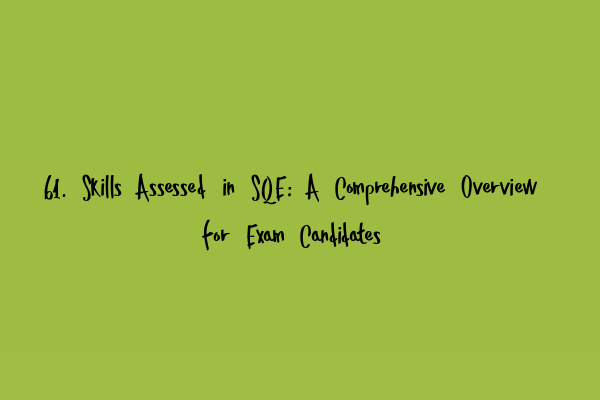61. Skills Assessed in SQE: A Comprehensive Overview for Exam Candidates
Are you preparing for the Solicitors Qualifying Examination (SQE)? If so, you’re probably wondering what skills will be assessed in the exam. In this comprehensive overview, we’ll delve into the 61 skills that are assessed in the SQE, providing you with valuable insights to help you prepare effectively.
1. Advocacy
Advocacy is a key skill assessed in the SQE. It involves the ability to effectively present arguments and make persuasive oral submissions. To excel in this skill, candidates should practice their advocacy techniques, learn to structure their arguments logically, and present them in a clear and concise manner. SQE 1 Preparation Courses can provide candidates with the necessary resources and guidance to develop their advocacy skills.
2. Case and Transaction Management
Case and transaction management is a vital skill for solicitors. It encompasses the ability to efficiently manage legal cases, handle client transactions, and meet deadlines. Candidates should familiarize themselves with case management software and develop strong organizational skills to excel in this area.
3. Legal Research
Legal research is a fundamental skill assessed in the SQE. Candidates must be proficient in finding relevant legal sources, analyzing them, and applying the law to specific scenarios. Developing effective legal research skills involves understanding different legal databases, knowing how to use search operators, and critically evaluating the information obtained.
4. Client Care and Communication
Client care and communication skills are essential for building strong relationships with clients. Candidates should learn to effectively communicate legal advice, manage client expectations, and maintain confidentiality. Developing active listening skills and clear written communication are also crucial in this area.
5. Drafting
Drafting is a core skill for solicitors. It involves the ability to prepare accurate and concise legal documents. Candidates should practice drafting legal documents such as contracts, pleadings, and letters. SQE 2 Preparation Courses can provide valuable drafting exercises and feedback to help candidates refine their drafting skills.
6. Interviewing
Interviewing skills are assessed in the SQE to ensure candidates can effectively gather information from clients and witnesses. Candidates should learn to conduct structured interviews, ask open-ended questions, and actively listen to the responses. Role-playing exercises and practice interviews can help candidates develop their interviewing skills.
7. Legal Writing
Legal writing is a critical skill for solicitors. Candidates must demonstrate the ability to write clear, concise, and persuasive legal documents. They should practice writing legal opinions, memoranda, and submissions, paying particular attention to logical reasoning and accurate use of legal terminology.
8. Negotiation
Negotiation skills are essential for solicitors involved in dispute resolution and contract negotiations. Candidates should learn different negotiation techniques, develop problem-solving skills, and practice negotiating in various scenarios. Taking part in mock negotiations can provide valuable experiential learning opportunities.
9. Professional Ethics and Judgment
Professional ethics and judgment are central to the practice of law. Candidates must demonstrate an understanding of legal ethics, confidentiality, conflicts of interest, and their professional responsibilities. They should be able to analyze ethical dilemmas and apply appropriate solutions. SRA SQE Exam Dates can help candidates plan their exam preparation schedule effectively.
10. Problem Solving
Problem-solving skills are crucial for solicitors. Candidates must demonstrate the ability to analyze complex legal issues, identify relevant legal principles, and apply them to practical situations. They should practice legal problem-solving exercises to enhance their critical thinking and analytical skills.
11. Professional Judgment
Professional judgment goes hand in hand with problem-solving skills. Candidates must be able to make sound decisions based on legal principles, ethics, and their professional experience. Developing professional judgment involves studying legal precedents, understanding the consequences of different courses of action, and considering the interests of all parties involved.
These are just a few examples of the 61 skills assessed in the SQE. Each skill plays an essential role in the practice of law, and candidates should dedicate sufficient time and effort to develop their proficiency in each area.
Preparation is key to success in the SQE. SQE 1 Practice Exam Questions and SQE 1 Practice Mocks FLK1 FLK2 can provide candidates with valuable resources to test their knowledge and assess their readiness for the exam. Additionally, enrolling in SQE 2 Preparation Courses can help candidates develop the necessary skills and techniques to excel in the SQE.
By understanding the skills assessed in the SQE and dedicating time to improve in each area, candidates can increase their chances of success in the examination. So, what are you waiting for? Start your SQE preparation journey today!
